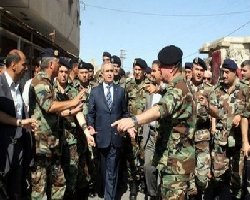Talk of a 'hot summer' has increased among the Lebanese since the beginning of the year. But in Lebanon's case, a 'hot summer' does not refer to the weather. Nor does it refer to the many festivals, concerts, beach parties and hundreds of other 'hot events' taking place.
By 'hot summer', the Lebanese mean the heat of war. Everyone in Lebanon is asking the same question: 'Do you think there will be a war this summer?'
Since the beginning of the year, the Israeli prime minister, defense minister, foreign minister and military chief have all issued war threats against Lebanon - threats not only aimed at Hezbollah, but at the Lebanese government and people.
Since then, increased tensions along the Lebanese-Israeli border have left the Lebanese in a constant state of anxiety - anticipating a strike at any moment, for any reason.
The scars of the 2006 July war have not yet healed and people say they are not willing to go through another.
Drums of war
The 2006 war was between Hezbollah and the state of Israel. Neither the Lebanese army nor the Lebanese government were directly involved. At that time Hezbollah was not part of the government and was seen as operating outside the realm of Lebanese government institutions. So its strongholds in the south of Lebanon and Beirut's Dahieh district were key targets.
But even though the war targeted a certain group of people in a specific geographical area, the whole country paid the bill; more than 1,500 Lebanese killed, mostly civilians. Around 1 million were displaced and the country's infrastructure was heavily damaged.
Internally displaced people from the south and Dahieh found refuge in public and private schools, monasteries, government institutions and other people's homes in safer areas like East Beirut, Mount Lebanon and the north.
However, this time around, people fear that the whole country will be targeted. The events of August 3 clearly indicate that the Lebanese army - with its limited capabilities - will be fighting against Israel.
A few hours after the clashes, Hassan Nasrallah, the Hezbollah leader, gave a pre-planned televised speech to mark the anniversary of the end of the 2006 war, in which he said: "This time Hezbollah did not act on its own and has put its capabilities under the control and command of the Lebanese army."
He also vowed, however, that "this is the last time that Hezbollah will not interfere to defend the army".
The drums of a full scale war are beating and the people fear that no area, religious sect or infrastructure will be safe.
PHOTO CAPTION
Lebanese President Michel Sleiman (C) visits the army outpost which was targetted in al-Adaysseh on the Lebanese-Israeli border.
Source: Aljazeera.net


 Home
Home Discover Islam
Discover Islam Quran Recitations
Quran Recitations Lectures
Lectures
 Fatwa
Fatwa Articles
Articles Fiqh
Fiqh E-Books
E-Books Boys & Girls
Boys & Girls  Articles
Articles










